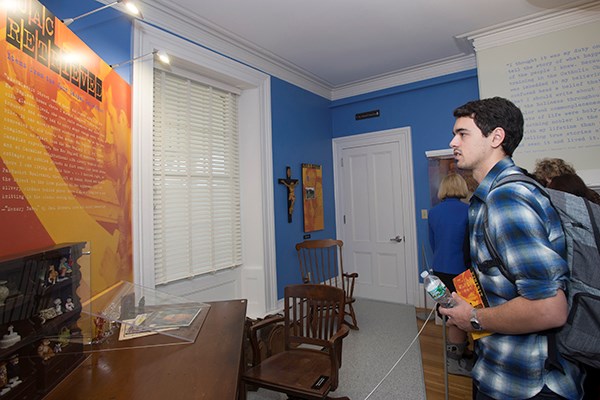Exhibit Showcases Writer’s Personal Side

10/16/2015
By Sheila Eppolito
The audience at the opening of “Kerouac Retrieved” was as large as it was diverse. The exhibit about Lowell’s famous son at the university’s Allen House drew hundreds of people, from freshly minted freshmen to Chancellor Jacquie Moloney, from those who didn’t know much about the writer to world-renowned experts on his every published work.
The exhibit – the latest in a series of generous gifts to the university from John Sampas, executor of the Kerouac estate and brother-in-law of the famous scribe – includes personal items retrieved from Kerouac’s last residence, in St. Petersburg, Fla.
The items, said English professor and Kerouac expert Todd Tietchen, help “contextualize Kerouac as more than just a famous Beat writer” and include some of the expected – the writer’s desk and chair, and unexpected – three rudimentary cat carriers constructed by Kerouac and marked with each favorite feline’s name (Timmy, Pitou and Dobie) and signed on the bottom in the famous Kerouac cursive.
“I heard about Kerouac in an honors class I’m taking that’s all about Lowell, and I thought I’d check out the exhibit,” said Tyler Tringale, a freshman computer science major from Peabody. Tringale’s casual interest morphed into something more after perusing a bit, resulting in some careful angling for cell phone photos of each exhibit item.
There were lots of students like Tringale, mostly young students who’d been previously unaware of Lowell’s best-known writer, but who, after absorbing the buzz and enthusiasm of a houseful of Jack fans and memorabilia, joined the besotted.
Michael Millner, like Tietchen an English professor and Kerouac expert, shared his experience travelling – at Sampas’ invitation – with Tietchen to mine for exhibit items in Kerouac’s former Florida home.
“I didn’t know what to expect,” Millner said. “Upon entering the home, I saw the desk. It looked like any writer’s desk, strewn with papers and pencils and drafts. Sort of like my own, only neater.”
Then he got to the cat carriers. “I picked them up carefully and walked them across the room, and then it hit me: Jack Kerouac had done the same thing – walked these carriers, maybe taking the exact same steps.”
The carriers’ importance, Millner said, was their role in allowing a restless man “to keep moving while keeping the things he loved close by.”
Sound recording technology freshman Spencer Cardillo was surprised to find he had more in common with Kerouac than he thought. As a member of the university’s jazz band, the Northboro native was pleased to see that among the smattering of items the writer held onto were some jazz records and a variety of mementos.
“I like knick-knacks, too. They can be so small, but have amazing detail,” Cardillo said. “And they remind you of a place you’ve been or an experience you’ve had. I think it’s cool Kerouac held onto so many.”
Above the writer’s desk, which was a gift from his sister, Caroline, perch figurines representing many of his interests: Shiva figures and a pottery cat and dog from India, remarkably well-preserved articles of Lowell Tech-branded clothing and a large crucifix, a nod to his French-American Catholicism.
A recurring theme among the attendees was the sense that Kerouac is Lowell’s: that exhibiting his personal belongings here, in his hometown, is appropriate and cause for celebration.
The opening drew Kerouac enthusiasts from further afield as well, including a standing-room-only panel discussion called “Race, Ethnicity and the American Hipster” featuring Jean-Christophe Cloutier of the University of Pennsylvania, Tim Z. Hernandez of the University of Texas El Paso and D. Quentin Miller of Suffolk University. The discussion was inspired by essays about race by Norman Mailer and James Baldwin and moderated by UMass Lowell English Prof. Keith Mitchell.
“One of the university’s pillars is the importance of place. When we talk about ‘Our Legacy, Our Place’ this is what we mean,” Moloney said “Here we are on this day, in this city that we inhabit, in the place Kerouac called home.”
“Kerouac Retrieved” is free and open to the public. Visit uml.edu/maps for directions and details about accessibility at Allen House.
